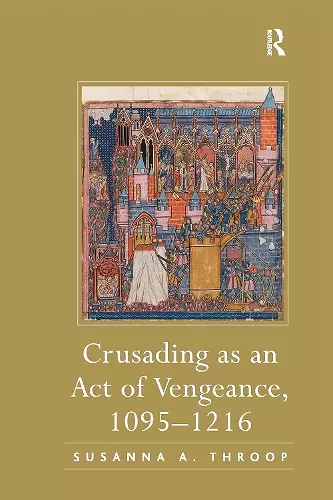Crusading as an Act of Vengeance, 1095–1216
Format:Paperback
Publisher:Taylor & Francis Ltd
Published:30th Jun '20
Currently unavailable, and unfortunately no date known when it will be back
This paperback is available in another edition too:
- Hardback£150.00(9780754665823)

Only recently have historians of the crusades begun to seriously investigate the presence of the idea of crusading as an act of vengeance, despite its frequent appearance in crusading sources. Understandably, many historians have primarily concentrated on non-ecclesiastical phenomena such as feuding, purportedly a component of "secular" culture and the interpersonal obligations inherent in medieval society. This has led scholars to several assumptions regarding the nature of medieval vengeance and the role that various cultures of vengeance played in the crusading movement. This monograph revises those assumptions and posits a new understanding of how crusading was conceived as an act of vengeance in the context of the twelfth and early thirteenth centuries. Through textual analysis of specific medieval vocabulary it has been possible to clarify the changing course of the concept of vengeance in general as well as the more specific idea of crusading as an act of vengeance. The concept of vengeance was intimately connected with the ideas of justice and punishment. It was perceived as an expression of power, embedded in a series of commonly understood emotional responses, and also as an expression of orthodox Christian values. There was furthermore a strong link between religious zeal, righteous anger, and the vocabulary of vengeance. By looking at these concepts in detail, and in the context of current crusading methodologies, fresh vistas are revealed that allow for a better understanding of the crusading movement and those who "took the cross," with broader implications for the study of crusading ideology and twelfth-century spirituality in general.
... a very thoughtful and well-written work. ... This excellent study provides further evidence that crusading was first and foremost a religious activity. Speculum '... in Crusading as an Act of Vengeance, she [Throop] has done a valuable service to scholars who wish to tackle the crusades and the dilemma of religious violence.' Reviews in History 'In a closely argued, lucid, and thoughtful study of the motif of vengeance in the formative century of crusading practice and discourse, Susanna Throop has made an important contribution to our understanding of the place of the crusade within twelfth-century culture; of crusading’s rhetorical dimensions; and of the ways in which it exploited a wide range of social, political, historical, and textual referents to create and sustain its impact on numerous people’s imaginations.' Catholic Historical Review '... Throop has usefully and suggestively rearranged the chronology and textual focus of the use of the rhetoric of vengeance to justify crusade violence with clarity and care.' English Historical Review 'This is an important contribution. Its novel approach and new interpretation enriches the studies of crusading and the study of religious violence in general. Throop’s work opens the way for further research that would integrate the overall historiography of the twelfth-century with our evolving understanding of twelfth-century crusading.' Parergon 'Susanna Throop’s monograph offers a careful consideration of the idea of spiritual vengeance in the long thirteenth century, taking Pope Innocent III ’s death in 1216 as her closing point. It is a book full of interesting insights and thought-provoking evidence ... Ashgate have strengthened its reputation as a foremost publisher of crusading scholarship.' French History
ISBN: 9780367602413
Dimensions: unknown
Weight: 460g
242 pages